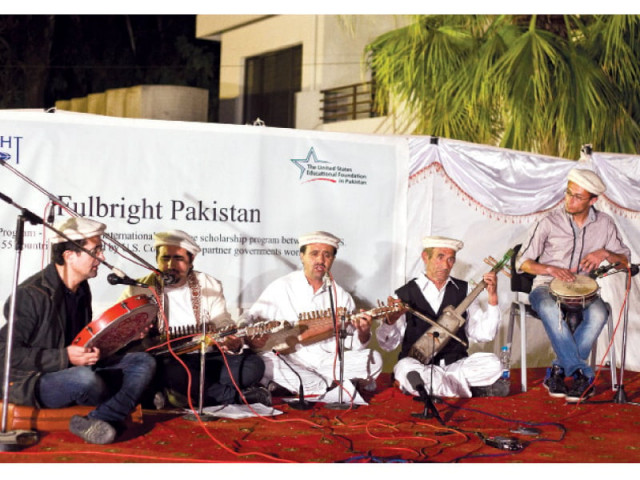Living the culture: Continuing the tradition through verse and emotions
Wakhi musical night held in the capital.

The group performing during the concert. PHOTO: MYRA IQBAL/ EXPRESS
When we begin to preserve cultures, some of their essence dissipates, detracting the humanness of the language or tradition and replacing it with a nostalgic reverence of something that was, but is no longer tangible. It is for this reason that Richard Wolf, Professor of Music and South Asian Studies at Harvard University, believes in the continuous stimulation and cross-communication of Wakhi poets and musicians.
“It is hard to preserve the old,” shares Wolf, who is on a Fullbright grant researching the Wakhi population in Pakistan and bordering Tajikistan, adding that there is a greater need to encourage musicians to continue their tradition and to pass it on as heritage.
At a musical evening organised by the United States Education Foundation (USEFP), in Islamabad, five artists from Gilgit-Baltistan serenaded an intimate audience with poignant verses about love and loss against the incommunicable splendour and quietude of the mountains.
Melodies such as “Ambar-e-Pamir” and “Anorishirin” sought to describe the intensity of longing for the beloved through the analogy of the sweet-scented mountain flower known as “Ambar” or the beauty of the landscape, tranquil and captivating. Darker tunes such as “Ye zhu spreghi rano” lamented a tragic road accident.
Artists Rahmatullah Baig, Fazal Rahman Shirin Sado — the latter part of whose name is a nickname derived from his sweet voice — Javed Ali Khan, Dolat Wali Baig and Waqar Ali played the rubab, tumbek and daf, expressing their joys and sorrows with heartfelt vocals.

“In Wakhi tradition, the poetry is written before the music is composed,” Wolf explains.
It is this intimate connection between the language, which is unique in its roots and comparison with other Pakistani dialects, and the song itself, which is in itself an extended documentation of Wakhi culture.
There are an estimated 100,000 Wakhi people concentrated along the borders of Pakistan, China, Tajikistan and Afghanistan.
Wakhis speak a complex language, with a large number of sounds that are unfamiliar within the rest of Pakistan, and resembling only some of the vowels within languages of the Gilgit-Baltistan region.
For linguist Fazal Amin Baig, language is no less than music, consisting of sounds that come together to create intelligible, poetic expression.
Collaborating with Professor Wolf on his quest to understand the context of the music which he discovered on a trip to Hunza in 1997, Baig’s commitment to the Wakhi language is evident in his curiosity about its similarities and differences from other local and foreign languages.
While instruments used in Pamiri music are not unique to Wakhi tradition alone, the use of language and analogies lends exclusivity to the musical expression of the area, in a sense vividly preserving and documenting the culture without encasing it behind a camera or museum glass.
Published in The Express Tribune, March 10th, 2013.


















COMMENTS
Comments are moderated and generally will be posted if they are on-topic and not abusive.
For more information, please see our Comments FAQ